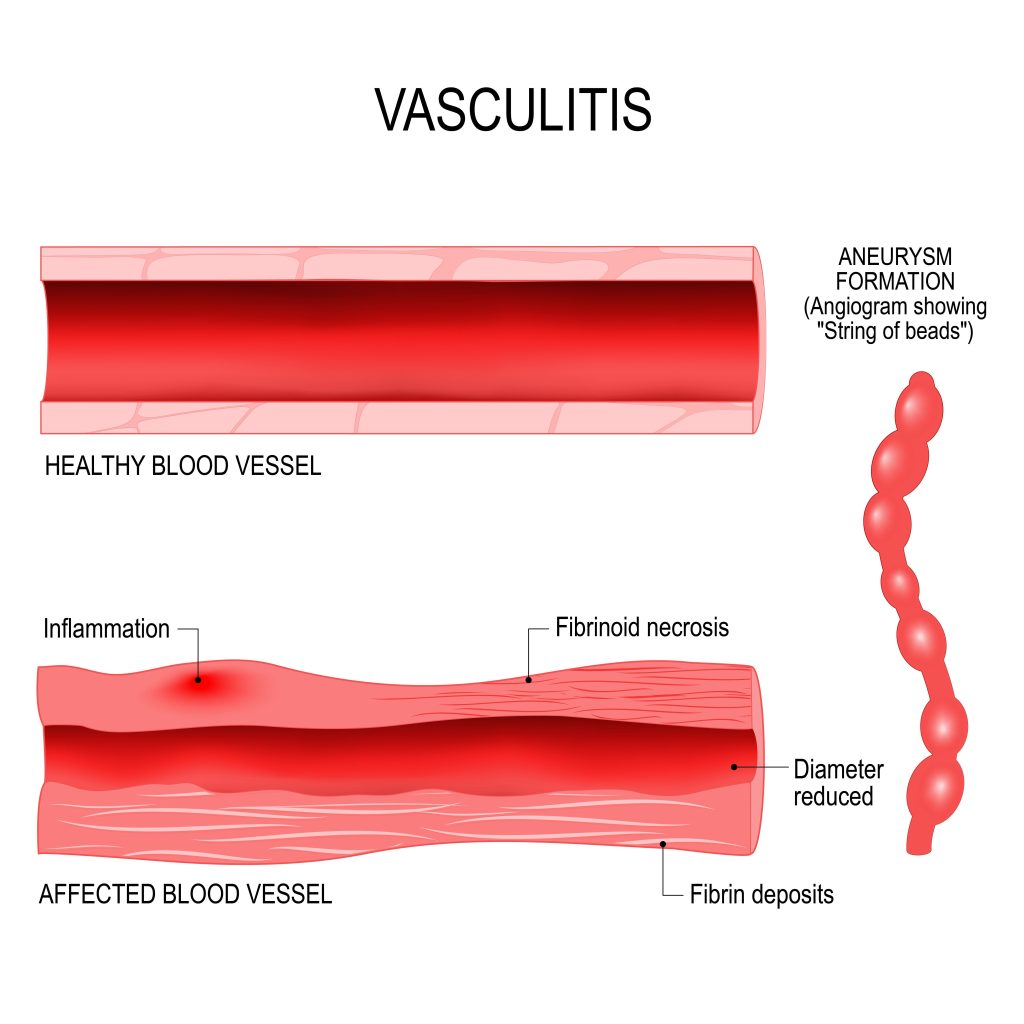Mark Kopec Now
Vasculitis
Medical Malpractice with Baltimore Vasculitis Lawyer Mark Kopec
Vasculitis is a group of inflammatory conditions that affect the blood vessels. It occurs when the body’s immune system mistakenly attacks its own blood vessels, causing them to become inflamed and damaged. Consequently, this damage can lead to a variety of symptoms, depending on the specific type of vasculitis and the blood vessels affected. If you have been injured, then you may have a medical malpractice claim and need the Baltimore vasculitis lawyer.
Anatomy and Function of Blood Vessels
Blood vessels generally are tubular structures that carry blood throughout the body. They can be classified into three main types:
- Arteries: These vessels carry blood away from the heart to the body’s tissues. They are generally thick-walled to withstand the high pressure of blood pumped from the heart.
- Veins: These vessels carry blood back to the heart from the body’s tissues. They have thinner walls than arteries and often contain valves to prevent blood from flowing backward.
- Capillaries: These are the smallest blood vessels, connecting arteries to veins. They allow for the exchange of oxygen, nutrients, and waste products between the blood and also the surrounding tissues.

Symptoms of Vasculitis
The symptoms of vasculitis can vary widely depending on the type of vasculitis and the blood vessels involved. However, some common symptoms include:
- Fever
- Fatigue
- Weight loss
- Joint pain
- Muscle pain
- Skin rash
- Nerve damage
- Organ damage
Specific symptoms may also depend on the location of the inflamed blood vessels. For example, vasculitis affecting the blood vessels in the kidneys can lead to kidney failure, while vasculitis affecting the blood vessels in the brain can cause stroke.
Diagnosis of Vasculitis
Diagnosing vasculitis often involves a combination of medical history, physical examination, and laboratory tests. Medical doctors who may be involved in the diagnosis include:
- Rheumatologists: Specialists in the diagnosis and treatment of autoimmune diseases, including vasculitis.
- Primary care physicians: Often the first point of contact for patients with symptoms of vasculitis.
- Vascular surgeons: Specialists in the treatment of blood vessel disorders.
Common tests used to diagnose vasculitis include:
- Blood tests: To check for inflammation, anemia, and other abnormalities.
- Imaging tests: Such as X-rays, CT Scans, or MRIs, to visualize the blood vessels.
- Biopsy: A procedure in which a small sample of tissue is removed from an affected blood vessel for examination under a microscope.
Baltimore vasculitis lawyer Mark Kopec at the Kopec Law Firm can review the tests used to make your diagnosis to determine if there was a delay.
Treatment of Vasculitis
Treatment for vasculitis depends on the specific type of vasculitis, the severity of the condition, and the organs involved. Medical doctors who may be involved in the treatment include:
- Rheumatologists
- Primary care physicians
- Vascular surgeons
- Nephrologists (if the kidneys are affected)
- Neurologists (if it affects the brain or nervous system)
Common treatments for vasculitis may include:
- Medications: Such as corticosteroids, immunosuppressants, or blood pressure medications, to reduce inflammation and prevent organ damage.
- Plasmapheresis: A procedure that removes harmful antibodies from the blood.
- Surgery: In some cases, surgery may be necessary to repair damaged blood vessels or treat complications.
Prognosis
The prognosis for vasculitis varies depending on the type of vasculitis, the severity of the condition, and the promptness of treatment. Some types of vasculitis can be treated effectively, while others may be more difficult to manage. Early diagnosis and treatment can improve the prognosis.
Medical Malpractice Claims with Baltimore Vasculitis Lawyer Mark Kopec
Medical malpractice occurs when a healthcare provider fails to provide reasonable care, resulting in harm to the patient. In the context of vasculitis, potential medical malpractice claims may include:
- Delayed diagnosis: If a healthcare provider fails to diagnose vasculitis in a timely manner, then leading to complications or organ damage.
- Incorrect diagnosis: If a healthcare provider misdiagnoses vasculitis, then leading to inappropriate treatment or delayed care.
- Failure to treat: If a healthcare provider fails to provide appropriate treatment for vasculitis, then resulting in worsening symptoms or complications.
- Medication errors: If a healthcare provider prescribes the wrong medication, fails to monitor medication levels, or fails to address adverse drug reactions.
- Surgical errors: If a healthcare provider performs a surgical procedure on a patient with vasculitis and causes complications due to negligence.
Next Step: Call Baltimore Vasculitis Lawyer Mark Kopec
If you believe you may have been the victim of medical malpractice related to vasculitis, then it is important to consult with an experienced medical malpractice attorney. We can help you assess your case and also determine whether you have a valid claim.
For advice on your specific situation, visit our free consultation page or video. Then contact the Kopec Law Firm at 800-604-0704 to speak directly with Attorney Mark Kopec. He is a top-rated Baltimore medical malpractice lawyer. The Kopec Law Firm is in Baltimore and pursues cases throughout Maryland and Washington, D.C.





